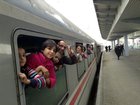Statement on the French military intervention by Afrique-Europe-Interact
This text is the short version of a much longer statement which has been published by Afrique-Europe-Interact at 7th of February 2013.
On February 2nd the French President Francois Hollande was welcomed enthusiastically in Mali. The good atmosphere could be confirmed by Malian activists of Afrique-Europe-Interact. This should primarily be understood as a sign that radical Islamism is by no means self-propelled, a fact that is also true for economically poor regions of the world with a predominantly Muslim population. On the contrary: The people in Mali, strongly characterized by Sufi-Islam, definitely hated the everyday impositions of the Sharia regime. Thus the atmosphere among the population, which in the beginning of the crisis was extremely sceptical about intervention and war, changed in a landslide after the representatives of the Islamic fundamentalist group “Ansar Dine”, who had been involved in the peace negotiations in Burkina Faso and Algeria, had relatively abruptly taken back their offers to participate in a dialogue.
Nevertheless there is no reason to approve the French military intervention in any way. On the one hand the danger of a disastrous guerilla war, primarily harming the civil population, hasn't be banned at all yet. On the other hand the social and economical situation has become more serious in Mali because of the military intervention. It also must be pointed out that France has no humanitarian reasons but the crucial factor for the intervention were political, economical and military interests. Thus it was by no means a coincident that France, together with the Economic Community of West African States (ECOWAS) and parts of the Malian elite haven't done a thing in favour of a “Malian solution” since the start of the crisis in the beginning of 2012, no matter if this solution had been carried out with civilian means of dialogue or with a limited deployment of the Malian army, within the framework of self-defence. Rather, with the means of several embargo measures (in reaction to a putsch in March 2012, that had been appreciated by large parts of the population) and further interventions from the outside, a situation of an apparent lack of alternatives was purposefully created. The end result was an absurd choice between a (supposed) attack on Bamako by the Isalmists and a military intervention under French command.
As far as the French interests are concerned, four aspects are being pointed out within the European debate: The trouble with an uncontrollable refuge for the Islamists (“Sahelistan”); the unrestricted access to mineral resources (primarily uranium) plus the security for other fields of business for French companies; the installation of a permanent military base in the north of Mali; and – as a quasi superordinate aim – the “capitalist penetration” of the Sahara, “the advancement of the global capitalism with the medium of war” (Forschungsstelle Flucht und Migration Berlin / Research association for flight and migration Berlin). All of these considerations are important but it must also be noticed that the topic is discussed almost exclusively from a geostrategical (metropolis) perspective, while the political conflicts within Mali or West Africa are not mentioned.
In concrete terms: The putsch that happened about a year ago gained huge approval primarily because the population had grown weary of the facade democracy but also of the enormity of corruption, cronyism and neglect of governmental duties, in a dimension, that is hard to imagine in Europe. Following the putsch there was a shift in the balance of power in Mali, which is the reason why France torpedoed massively the democratic movement, that had been initiated by the putsch. In this way France prepared the ground for the intervention gradually in advance. The aim is to take sides in the conflict within Mali – in an interplay with the mentioned economical and geostrategical aims – to prevent a grassroots democratic wildfire in the whole of West Africa, which would definitely weaken the political and economical hegemony of France throughout this region. Thus it perfectly fits into the well-known picture, that the IMF has agreed to grant a so-called assistance loan just two weeks after the beginning of the intervention, whereas during the months before all of the credits as well as huge parts of the development cooperation had been stopped by the West.
The conflict between the Tuareg in the north and the Malian central government, which has escalated periodically since the independence of Mali in 1960, also remains scarcely known. It should get into the focus though, because one of the three Islamic fundamentalist groups, which are now on the defensive, – the already mentioned Ansar Dine – has primarily got members who are Malian Tuareg. This explains why the groups who are involved in the organization of the “White March” (1), that was initiated by the Malian section of Afrique-Europe-Interact, consider the opening of a dialogue with those parts of the Tuareg population in the north, who see themselves neither represented by the Islamic fundamentalist Ansar Dine nor by the secularist MNLA, to be an essential key to a lasting peace. (The MNLA is the group that – without any further basis within the Tuareg population – started an uprising together with the Islamists, by whom they were excluded six months later.) This is the only way the Islamists can be marginalized and how they can be deprived of their power gradually, while at the same time a real reconciliation process between the Tuareg and the Malian society would begin. (2)
(1) Due to the intervention and the current state of emergency the March had to be postponed for at least 6 to 8 weeks, but still donations are very welcome!
(2) This text is an abbreviated version of a seven-page statement by Afrique-Europe-Interact to the current military intervention in Mali, which can be found on the website www.afrique-europe-interact.net, along with background articles, comments and up-to-date information.



